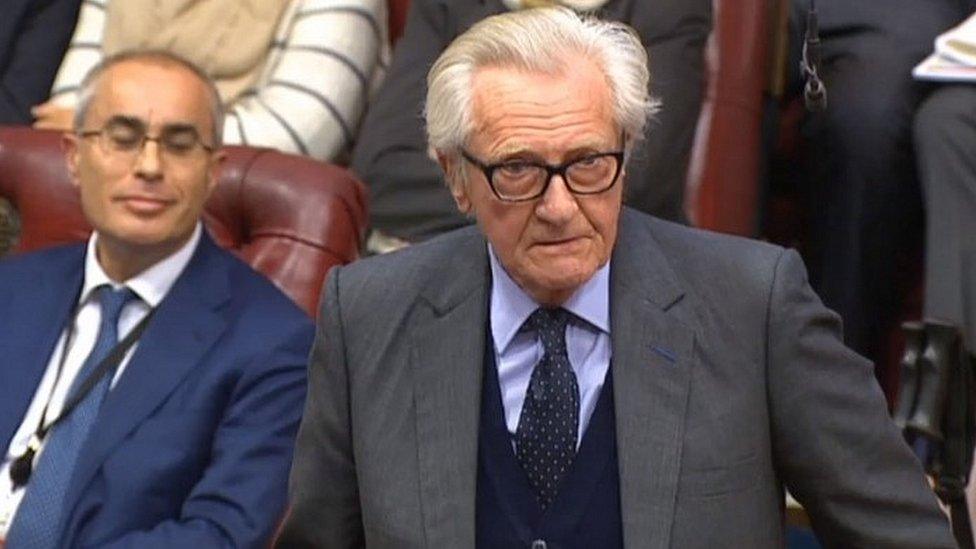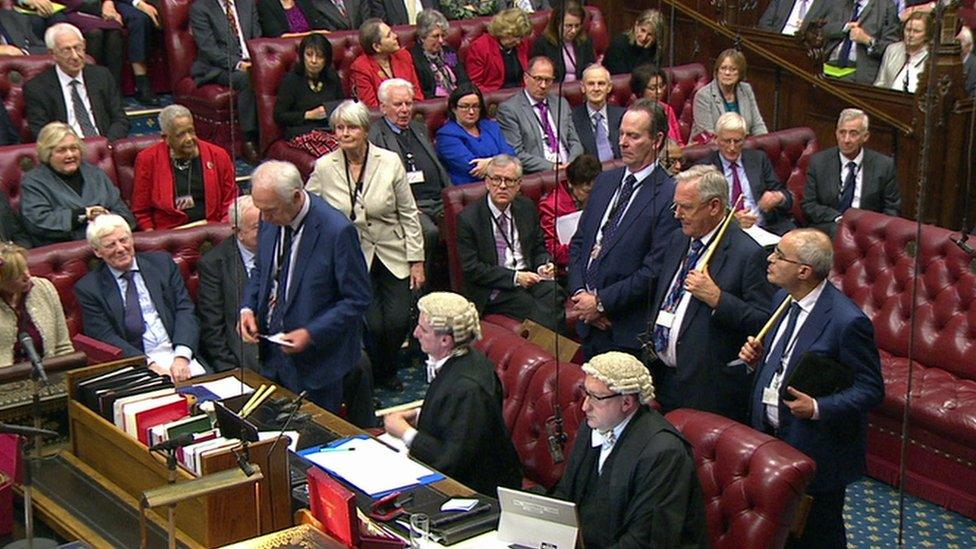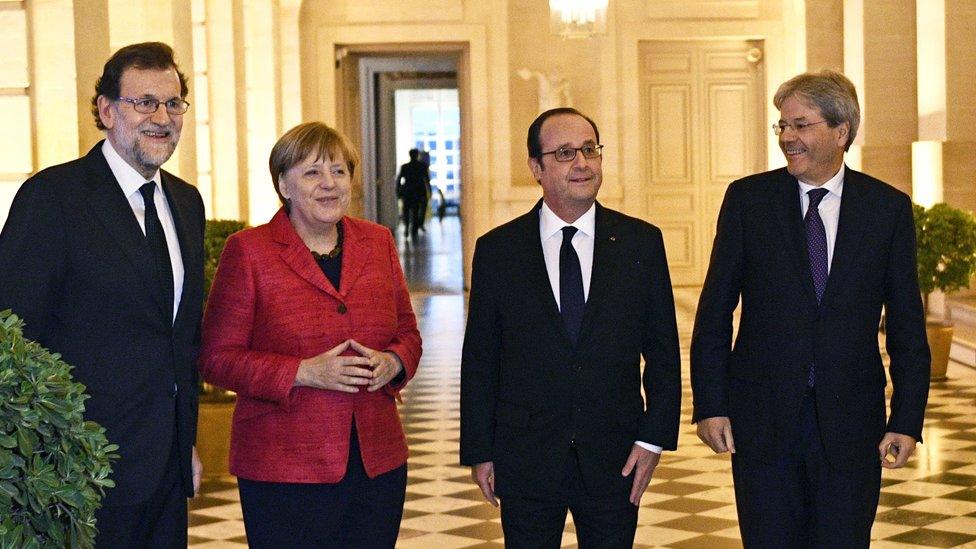Brexit: Government suffers second defeat in Lords
- Published

Former Deputy PM Lord Heseltine says he has been sacked from his advisory roles after being among 13 Tories to rebel
The government has suffered a second Brexit defeat in the House of Lords as peers backed, by 366 votes to 268, calls for a "meaningful" parliamentary vote on the final terms of withdrawal.
Ministers said it was disappointing and they would seek to overturn the move when the bill returns to the Commons.
Lord Heseltine, one of 13 Tory peers to rebel, said he had been sacked as a government adviser on regional growth.
The previous defeat was on the issue of guaranteeing the rights of EU citizens.
Lord Heseltine, 83, who served as a minister in the Thatcher government, said he was informed by the Conservative chief whip in the Lords he was to be sacked "from the five jobs with which I have been helping the government".
"This is entirely the right of the prime minister and I'm sorry that the expertise which I have put at the government's disposal over the last six years has now come to an end," he said.
"However, in the last resort, I believe, as I said in the House of Lords, the future of this country is inextricably interwoven with our European friends.
"It's the duty of Parliament to assert its sovereignty in determining the legacy we leave to new generations of young people."
Lord Heseltine had been brought in by former Prime Minister David Cameron to advise the government on a range of projects, including schemes in east London and Swansea.
'Deal or no deal'
After a three-hour debate on Tuesday, for the second time in a week peers amended the legislation that will authorise Theresa May to notify the EU of the UK's intention to leave and pave the way for official Brexit talks to begin.
The turnout in the Lords for the vote was the largest since 1831, according to Parliament's website.
The amendment, which was carried by a majority of 98, would require the final terms of the UK's withdrawal from the EU to be put to separate votes in the Commons and the Lords.
Some peers believe this would amount to a veto but ministers insist the UK would leave the EU anyway irrespective of whether it was approved or not.
As well as Lord Heseltine, 12 other Tory peers defied the government to vote in favour of the amendment, including former ministers Lord Deben and Viscount Hailsham.
The issue will now return to the Commons to be reconsidered by MPs, who have already rejected calls for the "meaningful vote" clause to be included in the legislation, saying verbal guarantees given by government on parliamentary scrutiny are sufficient.
The BBC's political editor Laura Kuenssberg said ministers were adamant they wouldn't back down after the Lords defeat and it was genuinely hard to tell at this stage if MPs had the numbers in the Commons to defeat the government.
Lord Forsyth says the government has committed to give Parliament a vote on a Brexit deal.
Speaking in favour of the amendment, QC and crossbench peer Lord Pannick said it would enable Parliament to exercise some "control" over the process of withdrawal and fulfil its duty to properly scrutinise.
"It must be for Parliament to decide whether to prefer no deal or the deal offered by the EU," he said.
"It will guarantee that the government must come back to both Houses and seek approval for the result of negotiations."
But government minister Lord Bridges said once Article 50 had been triggered, the process of leaving the EU was irrevocable and the amendment was totally unclear on what would happen if the UK and the EU were not able to agree a formal deal on the terms of exit.
"We will leave with a deal or we will leave without a deal. That is the choice on offer."
'Not in the dark'
Parliament, he insisted, would not be left "in the dark" during the two-year process and would be able to shape future legislation on the incorporation of EU law and potential changes to immigration rules.
He also argued the amendment would tie Mrs May's hands and make her task in getting a good deal "more difficult from day one".
Reacting to the defeat, Brexit Secretary David Davis suggested peers were threatening the UK's aim of getting negotiations under way as soon as possible.

The turnout of 634 Lords was the largest since 1831
"It is clear that some in the Lords would seek to frustrate that process, and it is the government's intention to ensure that does not happen," he said.
"We will now aim to overturn these amendments in the House of Commons."
But Labour's Baroness Smith said that given the referendum campaign had been full of arguments about reasserting Parliamentary sovereignty, it was appropriate that Parliament should have the "final say" on the process.
Lib Dems defeated
And former Lib Dem leader Nick Clegg urged MPs to "find the nerve" and ensure the requirement for a Parliamentary vote remained in the bill.
"I would urge MPs of all parties, including Brexiteers who campaigned to leave on the basis of parliamentary sovereignty, to stop Parliament being neutered.
"Parliament has a long history of ratifying treaties. What is the government scared of? If they cannot bring back a deal they are prepared to put before MPs, then it cannot be a deal that is good enough for Britain."
Earlier, a Lib Dem amendment calling for a second referendum on the terms of exit was comfortably defeated by 336 votes to 131.
Without a commitment to a second vote, the Lib Dems took the rare step of opposing the EU (Notification of Withdrawal) Bill at its third and final reading although peers overwhelmingly approved the bill and sent it back to the Commons.
Theresa May has said she wants to trigger Article 50 by the end of March but the Commons is unlikely to have an opportunity to consider the changes made by the Lords until the middle of next week as four days have been set aside for debate on the Budget.
- Published30 December 2020

- Published7 March 2017
